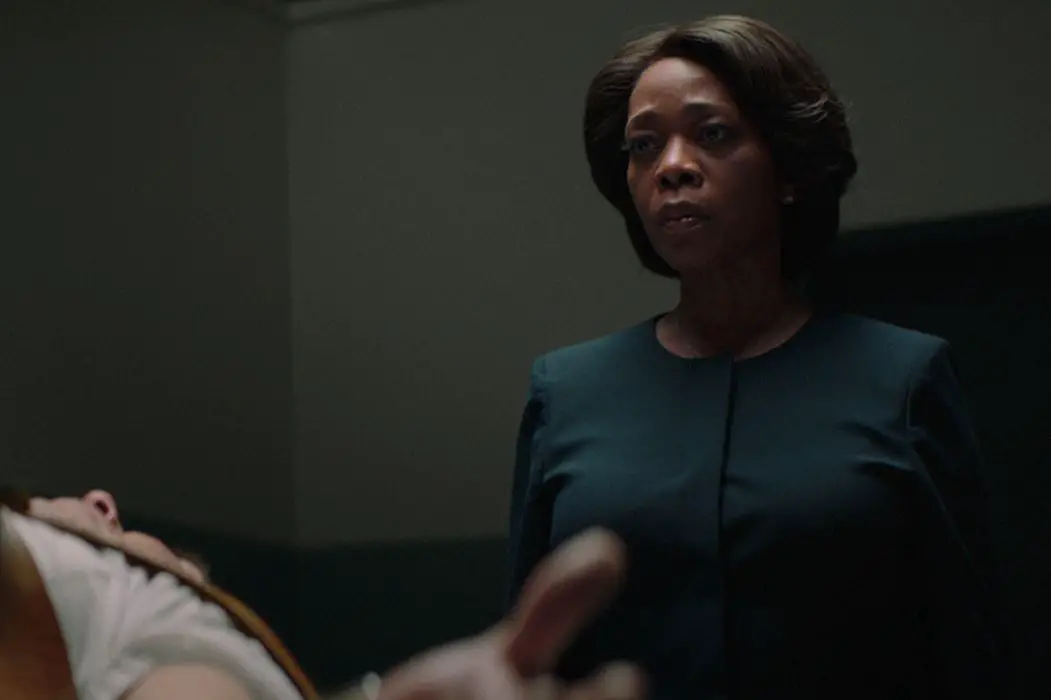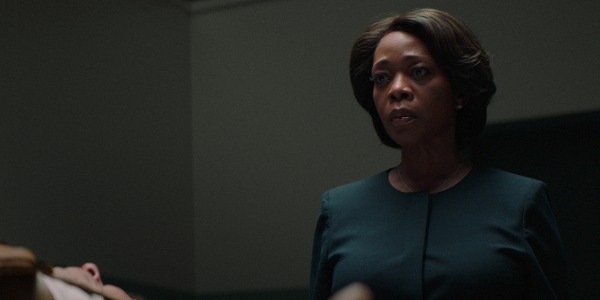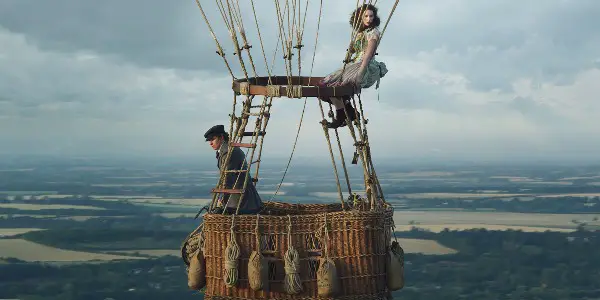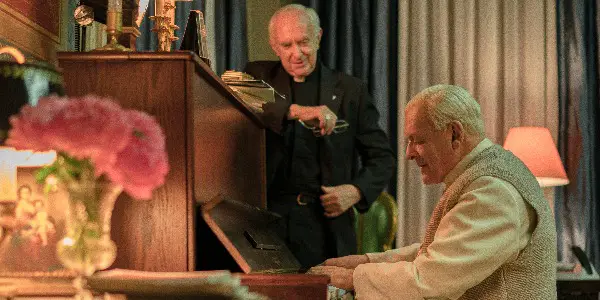2019 Film Fest 919 Report 3: CLEMENCY, THE AERONAUTS & THE TWO POPES

I'm a student at the University of North Carolina at…
Three very different films take center stage in my third report from the second annual Film Fest 919, which includes reviews of a dark drama about the death penalty, an aeronautical spectacle with two mega-stars, and a pleasant look at the Catholic Church’s most dramatic transition of power. To start, let’s take a look at Chinonye Chukwu‘s Sundance smash hit Clemency.
Clemency (Chinonye Chukwu)

Though it is a mercilessly dark film for its entire runtime, writer/director Chinonye Chukwu‘s Clemency begins with what has to be one of the most unforgettable scenes of the year. The time has come for another execution in the rigid, orderly prison of Warden Bernadine Williams (Alfre Woodard), and everyone involved treats it like business as usual. Bernadine is ice cold and methodical, and even when the execution begins to go terribly wrong, she’s mostly unflappable in the face of enormous pressure. Chukwu shoots the entire endeavor in the most clinical way possible; like Bernadine, the film is emotionally removed, almost frigid in its portrayal of this disturbing event. But the chilliness has a point: capital punishment is portrayed as inhuman and emotionless—as it should be.
When your film begins with a haunting death, shown in procedural-like detail, it’s hard to ever really escape that event. Clemency never tries to avoid the brutality of its topic: the idea of death hangs over every character, either as a looming physical threat or the principal constraint of a job that is beginning to take an emotional toll. Bernadine, more shaken by this botched execution than she initially lets on, eventually falls into a First Reformed-esque crisis of doubt. Her faith in the system—in the world of order and process that she has maintained so carefully for years—is finally beginning to collapse.
Bernadine’s spiritual and personal crossroads coincides with the impending execution of another prisoner, Anthony Woods (Aldis Hodge), who was convicted of murdering a police officer despite shaky evidence. The Woods case is extremely high-profile: protesters gather outside the prison, family members for the deceased lobby Bernadine to squash the dissent, and attorney Marty Lumetta (Richard Schiff) spends his days pushing the state to delay the execution. With a crumbling home life and a job that is more stressful than ever, Bernadine faces the fact that her ability to handle these crises may be failing.
Dramatically spare and often eerily silent, Clemency is a deeply introspective film, focused intently on a character who is unable to process the complexities of her life in a healthy way. As played by Woodard, Bernadine is so trapped by her conflicting emotions that we’re practically waiting for her to collapse. Chukwu‘s script is relentlessly internal, keeping the more extravagant expressions of raw anger to a minimum. The film sometimes tips into sentimentality and manipulation, but it’s forgivable in the face of such sustained intensity.
Clemency falters more notably in its second half—what initially works well as a solo character study becomes a bit sloppier when Chukwu shifts attention to Anthony Woods’ heartbreaking plight. The Woods subplot is essential, and Hodge is marvelous in the role, but the trade-off is Bernadine’s absence from the narrative for long stretches. A film that, to this point, has been driven by her deteriorating emotional state loses its disciplined focus. It’s a questionable move that threatens to derail the narrative, but Chukwu brings it all together for an equally nauseating and unshakable conclusion. With tears streaming down her face, Bernadine’s journey is captured in a stunning close-up, held by the camera for what feels like minutes. It’s a film that doesn’t quite know how to move from its harrowing opening to its tragic destination, but for those two moments alone, Clemency proves to be a painful, yet breathtaking experience.
The Aeronauts (Tom Harper)

The Aeronauts is a very bizarre movie, but I don’t necessarily mean “bizarre” in the traditional sense of the word. Though its concept is far from uninteresting, director Tom Harper‘s film is fundamentally split between the trappings of a traditional period drama and a very particular kind of overtly cinematic spectacle, a balance that, difficult as it may be, is not entirely impossible to pull off. Yet nothing in the structure of The Aeronauts is conducive to its competing stories, as its ineffective flashback style stitches together two vastly different narratives without ever achieving a fluid whole. The result is a visually impressive film without much in the way of tension or intrigue, one that lands its most basic punches while never rising above the cliches of its generic modes. A film that strains to be remarkable ends up feeling utterly ordinary: that’s what’s so bizarre about it.
Eddie Redmayne stars as James Glaisher, a young scientist who believes that the weather is something to be studied and predicted; of course, this is now known as meteorology. Glaisher often professes the life-changing potential of meteorology to his dismissive colleagues at the local science club, where he has become something of a laughingstock. Unable to secure financing for his expeditions to measure the weather, James has little hope of turning theoretical science into cold, hard facts. His only support comes from trusted friend and adviser John Trew (Yesterday‘s Himesh Patel), but that isn’t getting him any closer to his dreams.
Enter Amelia Wren (Felicity Jones), one of the world’s most talented aeronauts and a natural at selling this kind of spectacle. After her husband’s death in a hot air balloon accident (she was a fellow passenger on-board), Amelia has struggled to return to the skies, due to both personal doubt and institutional sexism. With Glaisher actively encouraging Amelia to be his partner on this daring flight, she reluctantly decides to embark on this dangerous journey—to go where no human beings have gone before.
This, however, is not exactly how the film plays out. The Aeronauts opens with James and Amelia’s highly attended balloon launch, later rotating between an experiential approach to their perilous flight and flashbacks that recap how they got to this point. In theory, I understand this structure: for all intents and purposes, this is a family film, so it’s a bit challenging to relentlessly depict the intense horrors of this journey. Yet director Harper and screenwriter Jack Thorne never make any attempt to shy away from the grisly details of aeronautical travel (including frostbite, lack of oxygen, even temporary madness), which makes the structure that much more illogical. There’s no build-up to the original launch, and even when Harper eventually stages a setpiece that puts the audience on edge, the tension vanishes as soon as we jump back in time.
In the end, as sympathetic as Jones and Redmayne‘s characters may be, the film simply never overcomes this glaring flaw. Even with a handful of awe-inspiring moments, The Aeronauts is an inconsequential adventure, a journey too familiar, routine, and misguided to ever make much of an impact.
The Two Popes (Fernando Meirelles)

Two of the most famous—and, at times, famously secretive—figures in modern world history receive a much more grounded treatment in City of God director Fernando Meirelles‘ The Two Popes, which presents a fictional conversation between Pope Benedict XVI (Anthony Hopkins) and future Pope Francis (Jonathan Pryce) as they negotiate the future of the Roman Catholic Church. Penned by Oscar-nominated scribe Anthony McCarten (who was feted at Film Fest 919 with the Distinguished Screenwriters Award), the film blends ostensibly serious material with a more playful, even satirical tone, staging an intense battle of philosophies as an oddball buddy comedy. Though it seems potentially ill-advised, the final product is something of a revelation: in fact, The Two Popes might be one of the biggest surprises of the year thus far.
The film begins in the aftermath of Pope John Paul II’s death in 2005, which represented a turning point in the history of the Church. The competing ideological factions—the tradition-bound conservatives and the progressive reformers—are both eager to install their own representative as the new leader of the Catholic Church, hoping to shape the future of one of the world’s most powerful organizations. On one side is Cardinal Joseph Ratzinger, a power-hungry conservative politician with a strong desire for the papacy; on the other is Cardinal Jorge Bergoglio, a reluctant leader from Argentina. Despite surprising opposition from a vocal group of reformist cardinals, Ratzinger is elected Pope as Benedict XVI.
A decade later, Bergoglio is preparing to retire as a cardinal—he wants to retreat from the public eye, serving his community as the leader of a small parish. Before Bergoglio can officially submit his request, Pope Benedict summons him to the Vatican for a meeting. What transpires is something unexpected: a clash of ideas that, eventually, ends with a shocking transfer of power unparalleled in the history of the Catholic Church.
Despite the intelligence and cleverness of its premise, it’s not unreasonable to be wary of The Two Popes. After last year’s Green Book, here comes another film about a mismatched odd couple that deals with significant social issues in a lighthearted, jovial manner; is this really what we need right now? While there are some interesting arguments to be had about how The Two Popes deals with its politics—I think the film lets off its lead characters far too easy when it comes to the Church’s history of sexual abuse—it is a much more enjoyable and formally ambitious film than its recent analogues. Meirelles‘ cinéma vérité style gives the film a sense of propulsive energy, using the occasionally jarring shaky cam to lampoon the Church’s secrecy; his camera gives us a vital look behind closed doors.
With Meirelles smoothly bouncing between fact and fiction, Pryce and Hopkins‘ prickly, heartfelt on-screen interactions elevate the material even further, bringing these enormous figures to life, flaws and all. The film certainly has a few major missteps: Meirelles and McCarten spend far too much time chronicling Bergoglio’s controversial dealings with the Argentinian military dictatorship in a flashback, to such a drastic extent that it grinds the whole film to a halt. But by charting a path from mutual opposition to forgiveness and a brighter future for the faith, The Two Popes earns its humorous and good-natured vibes. This is a crowd-pleaser I can really get behind.
Clemency will be released in the US on December 27, 2019. For all international release dates, click here.
The Aeronauts will be released in the US on December 6, 2019 and on November 6, 2019 in the UK. For all international release dates, click here.
The Two Popes will be released in the US on November 27, 2019 and on Netflix worldwide on December 20, 2019. For all international release dates, click here.
Does content like this matter to you?
Become a Member and support film journalism. Unlock access to all of Film Inquiry`s great articles. Join a community of like-minded readers who are passionate about cinema - get access to our private members Network, give back to independent filmmakers, and more.
I'm a student at the University of North Carolina at Chapel Hill. For 8 years, I've edited the blog Martin on Movies. This is where I review new releases, cover new trailers, and discuss important news in the entertainment industry. Some of my favorite movies- Casablanca, Inception, Singin' in the Rain, 2001: A Space Odyssey, The Wolf of Wall Street, The Nice Guys, La La Land, Airplane!, Skyfall, Raiders of the Lost Ark. You can find my other reviews and articles at Martin on Movies (http://martinonmovies.blogspot.com/).













